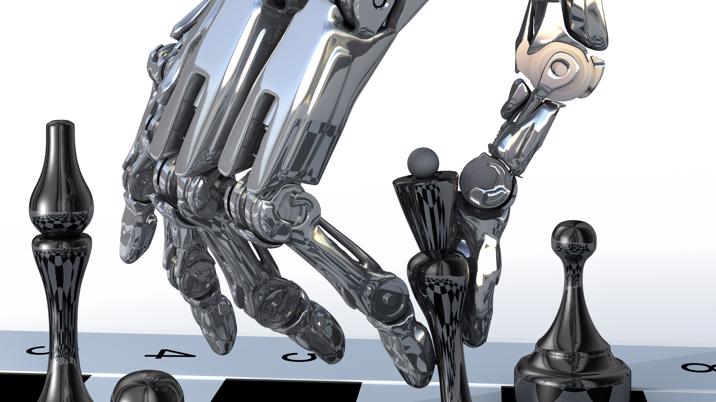
The robots are coming. But will they beat us? Machines have taken repetitive blue-collar jobs before but now it’s the turn of the professionals with jobs in sectors like medicine, law and, worst of all, publishing. Yes, this time it’s different because they are coming for our jobs: editors, writers and even publishers. Or are they? Could they really replace us all just like that?
We all like to think we’re irreplaceable but if artificial intelligence (AI) can beat the world’s top players of Go then it ought to be able to put a news story together. There’s more to those landmark AI breakthroughs than meets the eye. Most involve narrow AI, which is very good at one thing, rather than general AI, the stuff of science fiction in which machines become autonomous, self-determining entities able to apply themselves to a wide range of unfamiliar situations like humans do.
Machines find it harder to be truly original, funny or creative. In one project, AI learnt how to write just like the Beatles after analysing hundreds of the band’s songs. The song sounds just like the Beatles. You might think it good. But it isn’t the Beatles. It doesn’t bring them back to life. We would hope the Beatles would have moved on musically in 50 years. And the song won’t be in many Beatles collections because it’s not the Beatles – it lacks authenticity. You might be fooled by a fake Old Master but once you know it’s a fake, it’s not the same as the real thing – even if it looks just like it.
Does AI have to write as well as Tolstoy or Orwell to succeed? No, but to convince, it has to do something else; it has to be fresh and original – not a mere imitation, however good an imitation. Machines have been set to write novels and poetry and to paint pictures but their results tend to be pastiches of what’s come before (or it’s just extraordinarily alien). And they lack the element of surprise that new work needs. Anyway, people actually rather like knowing there are real people behind creative endeavours.
Technology is accelerating and I think in time we will be astounded by what AI will be capable of but it won’t be a like for like replacement of humans in publishing. Robot journalists are already writing financial news about company results and sports reports about local matches. They provide the facts. As every trainee journalist knows, news tends to be the most formulaic of journalistic forms. Football scores and share prices are of course vital. Yet automation began long ago. Placing some words around the numbers and sprinkling in some background facts pulled from a database is useful for producing short and sharp stories but hardly a revolution in journalism.
Under threat – the middleman
It is, of course, just the start. We tend to overestimate the impact of new technology in the short term and underestimate it in the long term.
In Boston last year, I heard Michio Kaku, the theoretical physicist and futurist writer, warn that the media is next in line for digitisation and that it is ultimately futile to resist as the music industry discovered.
If you want to be a billionaire like Jeff Bezos, he said, pick any industry, identify the middleman and digitise them to eliminate the sources of waste, aggravation or bottlenecks. The winners will be consumer and society. The survivors will be the semi-skilled workers: gardeners, police officers, plumbers, carpenters and so on will still have jobs. The losers will be the middlemen who can’t adjust. Why go to a human in the future? “Because you want something robots can’t provide,” he said, “you want intellectual capital. You want creativity, innovation, knowhow, analysis, intuition, leadership – none of which can be done by robots.” And all of which are necessary to magazines.
Automation could make simple news into a commodity. It could weigh up how popular stories might be, customise some news feeds, even edit a stream to match your interests. But a good magazine is so much more than an information filter to match the stated needs of the reader. Putting together a magazine, app or site that is bold, challenging and inspirational, with a personality and voice of its own and an overall coherence that the readers actually care about and want to engage with is a lot trickier. AI will help, but it won’t replace publishers.
Never underestimate technology. The ability to mine big data, the learning algorithms that can find patterns, correlations and surprising connections between data sets from absolutely everywhere, will lead to vital new sources for stories. That will revolutionise the media – and every other industry. It’s something really important that before too long machines will do a hundred or thousand times faster and better than humans.
We tend to overestimate the impact of new technology in the short term and underestimate it in the long term.










